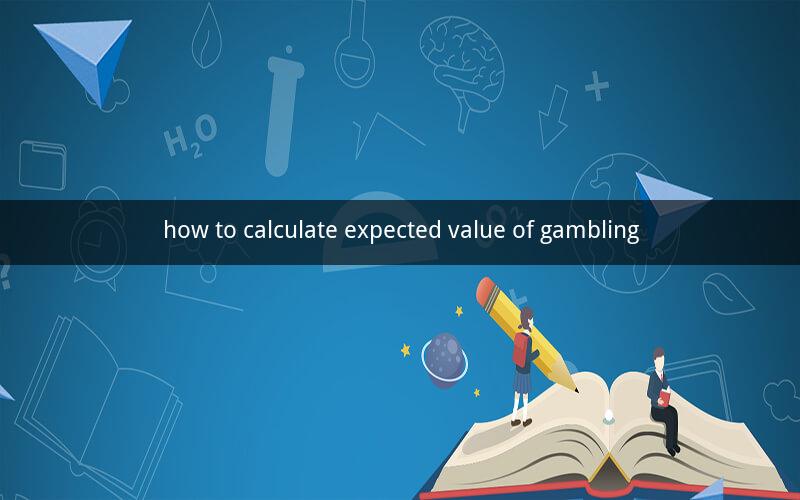
Calculating the Expected Value of Gambling
Table of Contents
1. Understanding Expected Value
2. The Basics of Probability
3. Applying Probability to Gamble
4. Factors Affecting Expected Value
5. Calculating Expected Value in Different Games
6. Risks and Limitations of Expected Value Calculations
7. Strategies for Maximizing Expected Value
8. Conclusion
1. Understanding Expected Value
Expected value, in the context of gambling, is a statistical measure that estimates the average outcome of a game or bet over a large number of trials. It is a critical concept for gamblers to understand as it helps in making informed decisions about the potential profitability of different bets.
2. The Basics of Probability
Probability is the likelihood that a specific event will occur. In gambling, probability is used to determine the chances of winning or losing a bet. For example, in a fair six-sided die roll, the probability of rolling a six is 1/6.
3. Applying Probability to Gamble
To calculate the expected value of a bet, you need to multiply the probability of winning by the amount won and the probability of losing by the amount lost. The formula for expected value (EV) is:
EV = (Probability of Winning × Amount Won) + (Probability of Losing × Amount Lost)
4. Factors Affecting Expected Value
Several factors can influence the expected value of a gambling bet:
- The odds of winning or losing
- The amount of the bet
- The payout structure of the game
- The house edge or advantage
5. Calculating Expected Value in Different Games
5.1 Slot Machines
Slot machines have a predetermined payout percentage, known as the return to player (RTP). To calculate the expected value of a slot machine bet:
EV = RTP × (Bet Amount / Total Bet Amount)
5.2 Blackjack
In blackjack, the expected value can be affected by the player's skill level and the dealer's rules. A basic strategy can help minimize the house edge and improve the expected value.
EV = (Probability of Winning × Amount Won) + (Probability of Losing × Amount Lost)
5.3 Poker
In poker, the expected value can vary widely depending on the player's skill level and the strategies employed. Calculating the expected value in poker requires a deeper understanding of hand probabilities and pot odds.
6. Risks and Limitations of Expected Value Calculations
While expected value is a useful tool for making decisions, it has limitations:
- It does not account for the possibility of rare events.
- It assumes that the game is fair and the player has no advantage.
- It does not consider the psychological aspects of gambling.
7. Strategies for Maximizing Expected Value
To maximize the expected value of a gambling bet:
- Choose games with a low house edge.
- Develop and use a solid betting strategy.
- Manage your bankroll effectively.
- Avoid chasing losses.
8. Conclusion
Calculating the expected value of a gambling bet is an essential skill for any gambler. By understanding the basics of probability and applying them to different games, gamblers can make more informed decisions and potentially improve their chances of winning.
---
FAQs
Q1: What is the difference between expected value and actual value?
A1: Expected value is a theoretical calculation, while actual value is the outcome of a single game or bet.
Q2: Can expected value be negative?
A2: Yes, if the probability of losing is higher than the probability of winning, the expected value can be negative.
Q3: How does the house edge affect expected value?
A3: The house edge is the difference between the expected value of the game and the actual expected value for the player, which reduces the player's expected value.
Q4: Can expected value be used to predict the outcome of a single game?
A4: No, expected value is a statistical measure for large numbers of trials; it cannot predict the outcome of a single game.
Q5: Is it possible to have a positive expected value in a game with a high house edge?
A5: Yes, if you have an advantage over the house, such as in certain poker strategies, you can have a positive expected value even in a game with a high house edge.
Q6: How does skill affect the expected value in games like poker?
A6: Skill can significantly affect the expected value in games like poker by reducing the house edge or giving the player an advantage over other players.
Q7: Can expected value be used to determine the best betting strategy?
A7: Yes, by calculating the expected value of different betting strategies, players can choose the one with the highest expected value.
Q8: Is it ethical to use expected value calculations to gain an advantage in gambling?
A8: The ethics of using expected value calculations in gambling depend on the rules and regulations of the game and the intentions of the player.
Q9: How can a player improve their expected value in a game with a known house edge?
A9: Players can improve their expected value by reducing the house edge through skill, strategy, and choosing games with lower house edges.
Q10: Is it possible to have a positive expected value in a game with a progressive jackpot?
A10: It is possible to have a positive expected value in a game with a progressive jackpot, especially if the player can influence the odds of winning the jackpot.